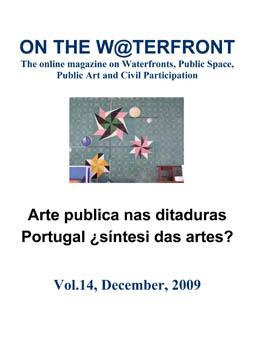Convidando amigos – a importância das redes sociais e de conhecimento na colaboração entre arquitectos e artistas
Palabras clave:
Lisboa, Arte Pública, Sintése das ArtesResumen
This paper is focused on the introduction of the principles of modern movement in Lisbon in a period between 1945 and 1965. This process was accompanied, later, by the arrival of a trend in vogue in post-war world’s debates: the synthesis or integration of the arts.
An important event was the Third IUA – International Union of Architects – Congress held in Lisbon in 1953, where the synthesis of the arts was debated. Here, the participants stressed the importance of the collaboration between architects and artists since the beginning of the creative process and emphasized that artists should always be chosen by the architect. The final resolutions of the
congress concerning the synthesis of the arts seem to have had direct impact on the city hall’s art commissioning, but would also meet former reflections of artists and architects in Lisbon.
In this particular context, this paper concentrates on a specific aspect, which seems to be a relevant matter in the production of “integrated art”: the personal relationships between architects and artists and the social and knowledge networks that connected them. Based on a series of oral testimonies of artists and architects, this paper seeks to enumerate some of the places and events, in Lisbon, where these relationships were established.
In a context of ideological isolation and cultural stagnation, the assumption of the modern movement was almost always led by opponents to the dictatorial regime. Personal relationships, which we have referred, were thus reinforced by a feeling of political and aesthetic affinities. Artists and architects who believed in the social function of art and architecture and in the benefits of collaboration were, thus, a small elite. In this small group everybody knew each other and everybody frequented the same places.
The School of Fine Arts, where many of the artists and architects were trained, the SNBA - National Society of Fine Arts, the most important association of artists, the EGAPS - General Exhibitions of Plastic Arts 1946-1956, a series of exhibitions with emphasis on the social purpose of art and architecture, and finally, the cafes, or coffee shops, collective spaces where all people could meet and share ideas.
In spite of being omitted in archive documents, works of art in public buildings and spaces have invisible links to other dimensions of reality – such as personal relationships between artists and architects – that should not be neglected in a comprehensive understanding of the phenomena.
Descargas
Publicado
Cómo citar
Número
Sección
Licencia
 La licencia permite: Compartir: copiar y redistribuir el material en cualquier medio o formato y Adaptar: remezclar, transformar y construir a partir del material para cualquier propósito, incluso comercial. El licenciante no puede revocar estas libertades siempre que cumpla con los términos de la licencia. Los derechos de autor están protegidos por el ISSN 1139-7365. On the w@terfront no tiene restricciones respecto a los derechos de autor de los autores y permite a los autores retener los derechos de publicación sin restricciones.
La licencia permite: Compartir: copiar y redistribuir el material en cualquier medio o formato y Adaptar: remezclar, transformar y construir a partir del material para cualquier propósito, incluso comercial. El licenciante no puede revocar estas libertades siempre que cumpla con los términos de la licencia. Los derechos de autor están protegidos por el ISSN 1139-7365. On the w@terfront no tiene restricciones respecto a los derechos de autor de los autores y permite a los autores retener los derechos de publicación sin restricciones.
Esta revista no aplica ningún tipo de cargo a los autores por la presentación o procesamiento de los artículos.







